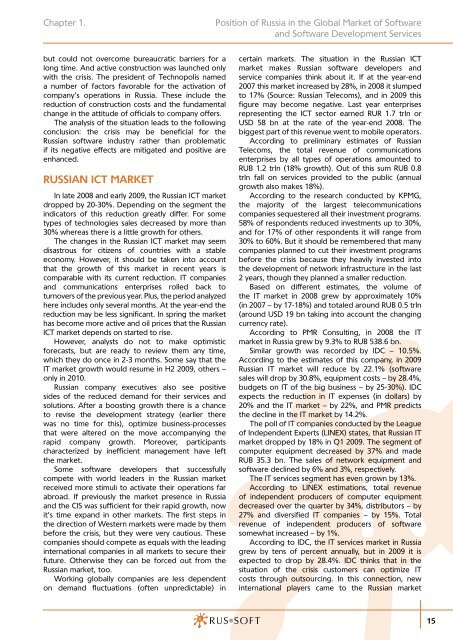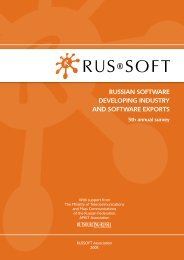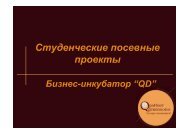russian software developing industry and software exports
russian software developing industry and software exports
russian software developing industry and software exports
You also want an ePaper? Increase the reach of your titles
YUMPU automatically turns print PDFs into web optimized ePapers that Google loves.
Chapter 1.<br />
Position of Russia in the Global Market of Software<br />
<strong>and</strong> Software Development Services<br />
but could not overcome bureaucratic barriers for a<br />
long time. And active construction was launched only<br />
with the crisis. The president of Technopolis named<br />
a number of factors favorable for the activation of<br />
company’s operations in Russia. These include the<br />
reduction of construction costs <strong>and</strong> the fundamental<br />
change in the attitude of officials to company offers.<br />
The analysis of the situation leads to the following<br />
conclusion: the crisis may be beneficial for the<br />
Russian <strong>software</strong> <strong>industry</strong> rather than problematic<br />
if its negative effects are mitigated <strong>and</strong> positive are<br />
enhanced.<br />
Russian ICT Market<br />
In late 2008 <strong>and</strong> early 2009, the Russian ICT market<br />
dropped by 20-30%. Depending on the segment the<br />
indicators of this reduction greatly differ. For some<br />
types of technologies sales decreased by more than<br />
30% whereas there is a little growth for others.<br />
The changes in the Russian ICT market may seem<br />
disastrous for citizens of countries with a stable<br />
economy. However, it should be taken into account<br />
that the growth of this market in recent years is<br />
comparable with its current reduction. IT companies<br />
<strong>and</strong> communications enterprises rolled back to<br />
turnovers of the previous year. Plus, the period analyzed<br />
here includes only several months. At the year-end the<br />
reduction may be less significant. In spring the market<br />
has become more active <strong>and</strong> oil prices that the Russian<br />
ICT market depends on started to rise.<br />
However, analysts do not to make optimistic<br />
forecasts, but are ready to review them any time,<br />
which they do once in 2-3 months. Some say that the<br />
IT market growth would resume in H2 2009, others –<br />
only in 2010.<br />
Russian company executives also see positive<br />
sides of the reduced dem<strong>and</strong> for their services <strong>and</strong><br />
solutions. After a boosting growth there is a chance<br />
to revise the development strategy (earlier there<br />
was no time for this), optimize business-processes<br />
that were altered on the move accompanying the<br />
rapid company growth. Moreover, participants<br />
characterized by inefficient management have left<br />
the market.<br />
Some <strong>software</strong> developers that successfully<br />
compete with world leaders in the Russian market<br />
received more stimuli to activate their operations far<br />
abroad. If previously the market presence in Russia<br />
<strong>and</strong> the CIS was sufficient for their rapid growth, now<br />
it’s time exp<strong>and</strong> in other markets. The first steps in<br />
the direction of Western markets were made by them<br />
before the crisis, but they were very cautious. These<br />
companies should compete as equals with the leading<br />
international companies in all markets to secure their<br />
future. Otherwise they can be forced out from the<br />
Russian market, too.<br />
Working globally companies are less dependent<br />
on dem<strong>and</strong> fluctuations (often unpredictable) in<br />
certain markets. The situation in the Russian ICT<br />
market makes Russian <strong>software</strong> developers <strong>and</strong><br />
service companies think about it. If at the year-end<br />
2007 this market increased by 28%, in 2008 it slumped<br />
to 17% (Source: Russian Telecoms), <strong>and</strong> in 2009 this<br />
figure may become negative. Last year enterprises<br />
representing the ICT sector earned RUR 1.7 trln or<br />
USD 58 bn at the rate of the year-end 2008. The<br />
biggest part of this revenue went to mobile operators.<br />
According to preliminary estimates of Russian<br />
Telecoms, the total revenue of communications<br />
enterprises by all types of operations amounted to<br />
RUB 1.2 trln (18% growth). Out of this sum RUB 0.8<br />
trln fall on services provided to the public (annual<br />
growth also makes 18%).<br />
According to the research conducted by KPMG,<br />
the majority of the largest telecommunications<br />
companies sequestered all their investment programs.<br />
58% of respondents reduced investments up to 30%,<br />
<strong>and</strong> for 17% of other respondents it will range from<br />
30% to 60%. But it should be remembered that many<br />
companies planned to cut their investment programs<br />
before the crisis because they heavily invested into<br />
the development of network infrastructure in the last<br />
2 years, though they planned a smaller reduction.<br />
Based on different estimates, the volume of<br />
the IT market in 2008 grew by approximately 10%<br />
(in 2007 – by 17-18%) <strong>and</strong> totaled around RUB 0.5 trln<br />
(around USD 19 bn taking into account the changing<br />
currency rate).<br />
According to PMR Consulting, in 2008 the IT<br />
market in Russia grew by 9.3% to RUB 538.6 bn.<br />
Similar growth was recorded by IDC – 10.5%.<br />
According to the estimates of this company, in 2009<br />
Russian IT market will reduce by 22.1% (<strong>software</strong><br />
sales will drop by 30.8%, equipment costs – by 28.4%,<br />
budgets on IT of the big business – by 25-30%). IDC<br />
expects the reduction in IT expenses (in dollars) by<br />
20% <strong>and</strong> the IT market – by 22%, <strong>and</strong> PMR predicts<br />
the decline in the IT market by 14.2%.<br />
The poll of IT companies conducted by the League<br />
of Independent Experts (LINEX) states, that Russian IT<br />
market dropped by 18% in Q1 2009. The segment of<br />
computer equipment decreased by 37% <strong>and</strong> made<br />
RUB 35.3 bn. The sales of network equipment <strong>and</strong><br />
<strong>software</strong> declined by 6% <strong>and</strong> 3%, respectively.<br />
The IT services segment has even grown by 13%.<br />
According to LINEX estimations, total revenue<br />
of independent producers of computer equipment<br />
decreased over the quarter by 34%, distributors – by<br />
27% <strong>and</strong> diversified IT companies – by 15%. Total<br />
revenue of independent producers of <strong>software</strong><br />
somewhat increased – by 1%.<br />
According to IDC, the IT services market in Russia<br />
grew by tens of percent annually, but in 2009 it is<br />
expected to drop by 28.4%. IDC thinks that in the<br />
situation of the crisis customers can optimize IT<br />
costs through outsourcing. In this connection, new<br />
international players came to the Russian market<br />
15








